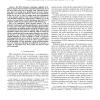236 search results - page 1 / 48 » Learning How to Propagate Using Random Probing |
119
Voted
CPAIOR
2009
Springer
15 years 9 months ago
2009
Springer
Abstract. In constraint programming there are often many choices regarding the propagation method to be used on the constraints of a problem. However, simple constraint solvers usu...
139
click to vote
ECCV
2006
Springer
16 years 4 months ago
2006
Springer
Belief propagation (BP) has become widely used for low-level vision problems and various inference techniques have been proposed for loopy graphs. These methods typically rely on a...
105
click to vote
SPAA
2005
ACM
15 years 8 months ago
2005
ACM
We study randomized algorithms for placing a sequence of n nodes on a circle with unit perimeter. Nodes divide the circle into disjoint arcs. We desire that a newly-arrived node (...
117
Voted
CIBCB
2006
IEEE
15 years 6 months ago
2006
IEEE
Abstract-- The DNA microarray technology, originally developed to measure the level of gene expression, had become one of the most widely used tools in genomic study. Microarrays h...
114
click to vote
CVPR
2010
IEEE
15 years 10 months ago
2010
IEEE
Conditional Random Field models have proved effective for several low-level computer vision problems. Inference in these models involves solving a combinatorial optimization probl...


